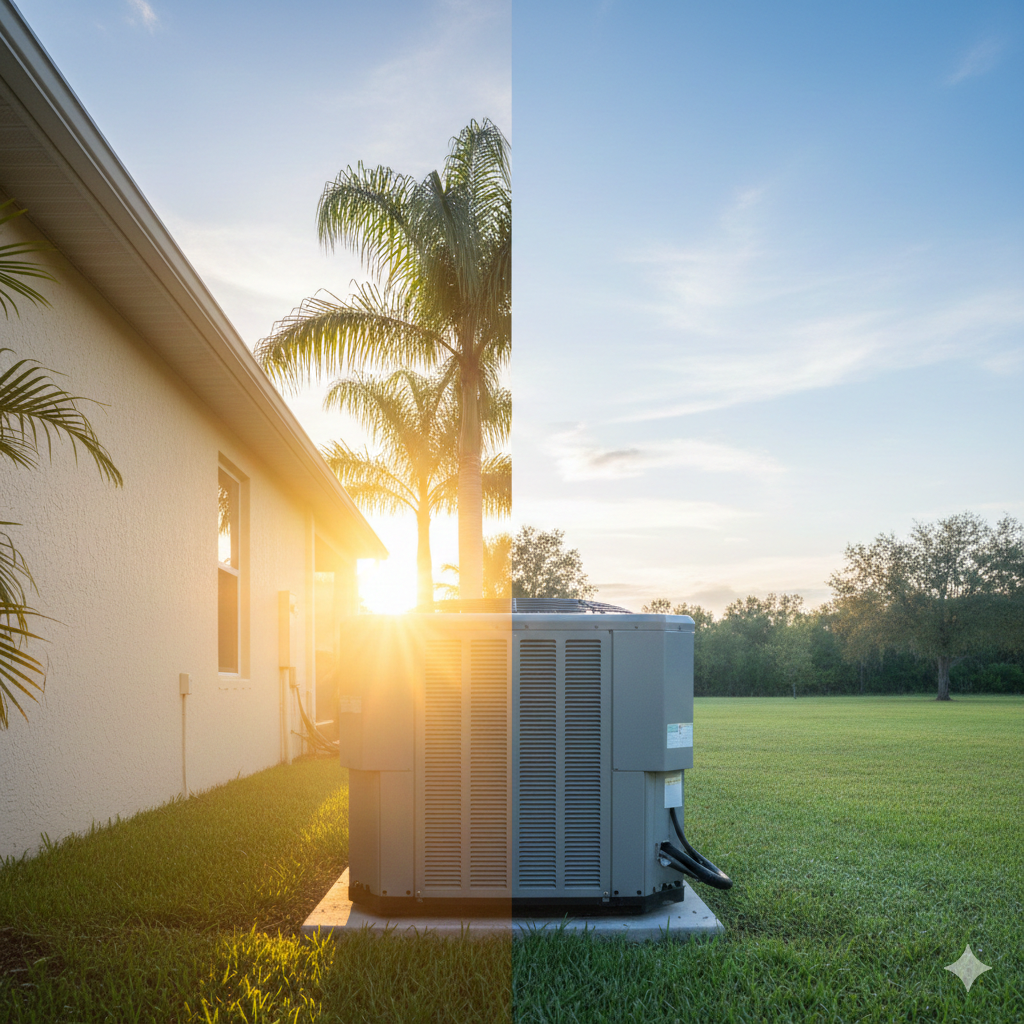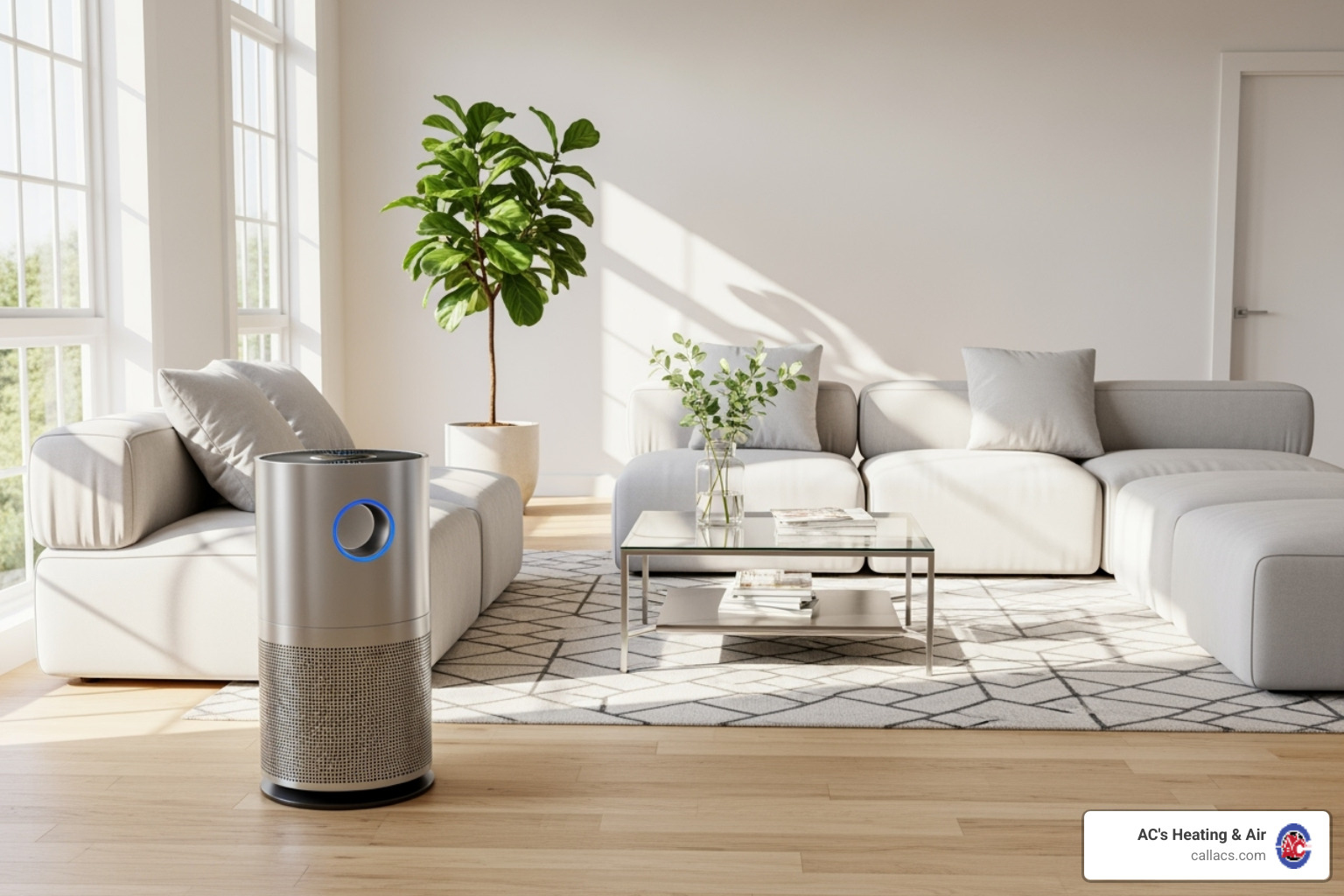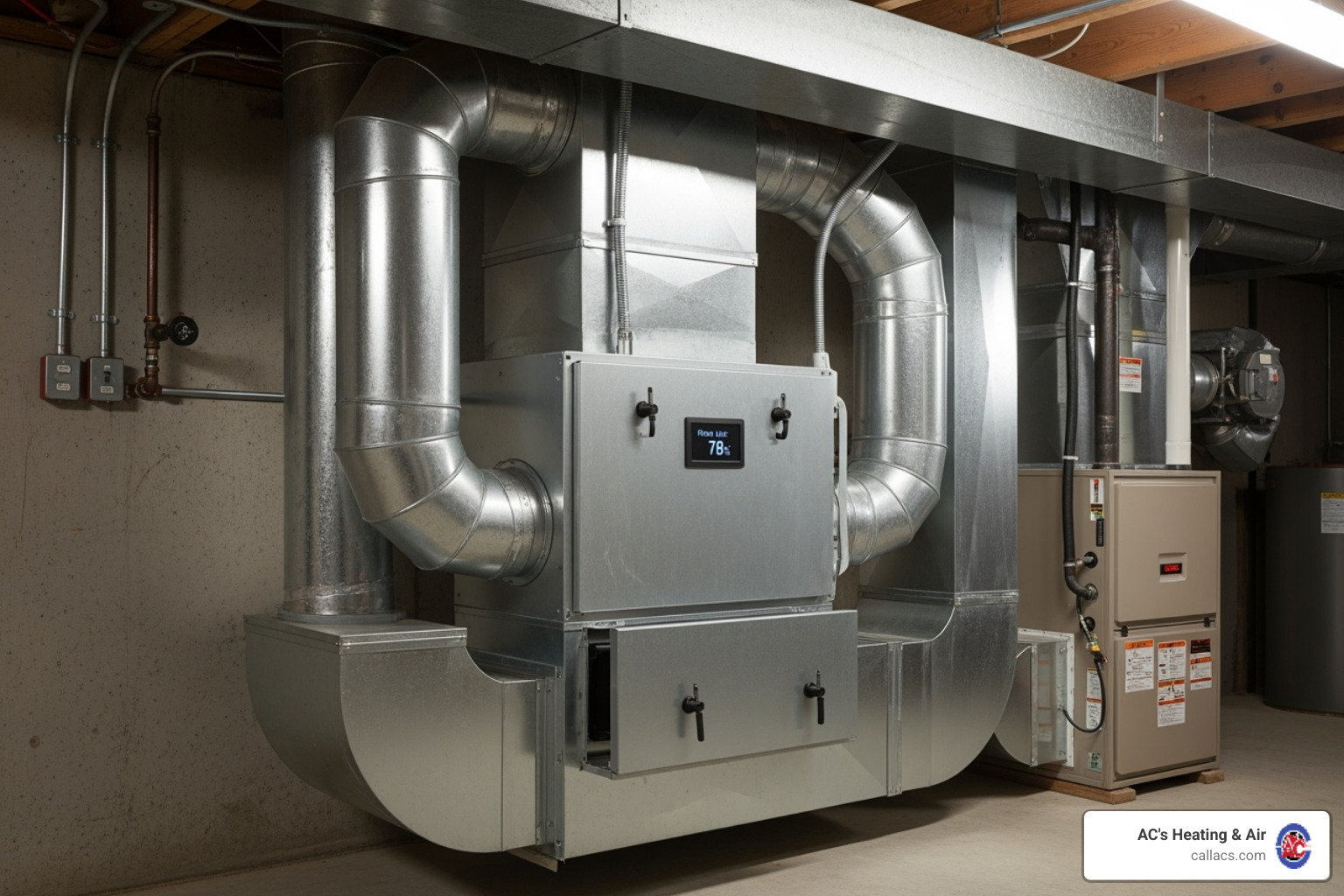Heat Pump vs. Air Conditioning Unit: Pros, Cons, and Key Differences

Comparing Heat Pumps and Air Conditioners: Benefits, Drawbacks, and Distinctions
When evaluating heat pump vs air conditioning unit, it’s essential to understand their key differences and advantages. Here’s a quick snapshot:
- Heat Pump:
- Pros: Energy-efficient, provides both heating and cooling, lowers utility bills.
- Cons: Higher upfront cost, less effective in freezing temperatures.
- Air Conditioning Unit:
- Pros: Lower initial cost, efficient cooling.
- Cons: Cooling only, requires a separate heating unit, higher long-term operating costs.
Deciding between a heat pump and an air conditioning unit involves considering factors like climate, budget, and energy efficiency. This guide will help you make the right choice for your home.
I’m Allen Chenault, the owner of AC's Heating & Air LLC. With 8 years of experience in the HVAC industry, I know the ins and outs of heat pump vs air conditioning unit to help you maintain a comfortable indoor climate year-round.

What Is a Heat Pump?
A heat pump is an HVAC system that both heats and cools your home. Think of it as a versatile machine that works all year round. It takes hot air from inside your home and pumps it outside to cool your home in the summer. In the winter, it does the opposite by pulling heat from the outside air and sending it inside.
How Does a Heat Pump Work?
A heat pump has a few key components: a compressor, refrigerant, and coils. It works by transferring heat rather than generating it.
- Cooling Mode: In the summer, the heat pump absorbs heat from inside your home and releases it outside. The refrigerant circulates through coils, absorbing heat and then compressing it to raise the temperature. A fan blows air over the cooled coils, and this cool air is then pushed into your home.
- Heating Mode: In the winter, the heat pump uses a reversing valve to switch directions. It pulls heat from the outside air and brings it inside. When temperatures drop below 30 degrees Fahrenheit, the heat pump uses auxiliary heat to maintain a comfortable temperature.
Pros of a Heat Pump
Energy Efficiency: Heat pumps are known for their high energy efficiency. They transfer heat instead of generating it, which uses less energy.
Dual Functionality: One of the biggest advantages is that they can both heat and cool your home. This eliminates the need for separate systems, saving you space and simplifying maintenance.
Minimal Upkeep: Heat pumps require minimal maintenance. A professional check-up twice a year is usually enough to keep them running smoothly.
Eco-Friendly: Heat pumps use electricity and do not burn fossil fuels, making them a greener option.
Cons of a Heat Pump
High Upfront Cost: Installing a heat pump can be expensive. Costs can range from $1,500 to $10,000 depending on the type and size of the unit.
Reduced Efficiency in Cold Climates: Heat pumps are less efficient in extremely cold weather. When temperatures drop below 30 degrees Fahrenheit, they may struggle to extract enough heat, requiring auxiliary heat sources.
Reliance on Electricity: Heat pumps need electricity to operate. If you live in an area with high electricity costs, this could be a concern.
Shorter Lifespan: Because they are used year-round, heat pumps generally have a shorter lifespan compared to furnaces, which are only used seasonally.

Next, let's dig into what an air conditioning unit is and how it works.
What Is an Air Conditioning Unit?
An air conditioning unit (AC) is a system designed to cool indoor spaces by removing heat from the air inside and releasing it outside. Unlike heat pumps, air conditioners only provide cooling and need to be paired with a separate heating system, like a furnace, to heat your home.
How Does an Air Conditioner Work?
Air conditioners use a process involving refrigerant, a compressor, a condenser coil, and an evaporator coil to cool your home. Here's how it works:
- Refrigerant: The refrigerant is a special fluid that absorbs and releases heat as it circulates through the AC system.
- Compressor: Located in the outdoor unit, the compressor pressurizes the refrigerant, turning it into a hot, high-pressure gas.
- Condenser Coil: The hot refrigerant gas flows to the condenser coil, also in the outdoor unit. Here, a fan blows air over the coil, cooling the refrigerant and turning it back into a liquid.
- Evaporator Coil: The cooled liquid refrigerant travels to the evaporator coil inside your home. As warm indoor air blows over the evaporator coil, the refrigerant absorbs the heat, cooling the air. This cooled air is then circulated back into your living spaces.
This cycle repeats continuously, ensuring a steady supply of cool air.
Pros of an Air Conditioner
Quick Cooling: Air conditioners are very effective at quickly cooling large spaces, making them ideal for hot summer days.
Air Filtration: Many air conditioners come with built-in air filters that improve indoor air quality by reducing allergens and pollutants.
Lower Initial Cost: Generally, air conditioners have a lower upfront cost compared to heat pumps.
Longer Lifespan: Air conditioners often last longer than heat pumps because they are used seasonally rather than year-round.
Cons of an Air Conditioner
High Energy Consumption: Air conditioners can use a lot of electricity, especially when running continuously during hot weather.
Requires Additional Heating System: Since air conditioners only cool, you'll need a separate heating system, like a furnace, for the colder months.
Higher Operational Cost: The cost to operate an air conditioner can be high, especially in regions with long, hot summers.
Next, we'll explore the key differences between heat pumps and air conditioning units to help you decide which system is best for your needs.
Heat Pump vs Air Conditioning Unit: Key Differences
When deciding between a heat pump vs air conditioning unit, understand their key differences. We'll break down the costs, efficiency, durability, and maintenance requirements of each system.
Cost: Buying and Installing
Heat Pump Cost: Heat pumps can range from $1,500 to $10,000. Most homeowners spend between $4,000 and $7,000. The cost depends on the size of your home, your geographical location and the type of heat pump (air-source, geothermal, or water-source).
Air Conditioner Cost: Air conditioners typically cost between $3,000 and $7,000. The price varies based on the type of AC unit (central, split, window, or portable) and the cooling capacity needed.
Installation Fees: Both systems require professional installation. Heat pumps generally have higher installation costs due to their complexity and the need for precise placement. Air conditioners can be less expensive to install, especially if you already have ductwork in place.
Ductwork: If your home doesn't have existing ductwork, installing it can add significantly to the cost for both systems. Ductless mini-split systems can be an alternative, especially for heat pumps.
Incentives: Look for local and federal incentives or rebates for installing energy-efficient systems like heat pumps. These can help offset the higher upfront costs.
Efficiency: Cost to Operate Differences
SEER Ratings: The Seasonal Energy Efficiency Ratio (SEER) measures cooling efficiency. Higher SEER ratings mean better energy efficiency. Both heat pumps and air conditioners have SEER ratings, but heat pumps often have higher ratings due to their dual heating and cooling capabilities.
HSPF Ratings: Heat pumps also have Heating Seasonal Performance Factor (HSPF) ratings, which measure heating efficiency. A higher HSPF means more efficient heating.
Energy Consumption: Heat pumps are generally more energy-efficient, especially in moderate climates. They use less energy to move heat rather than generate it. Air conditioners can consume more electricity, especially when used continuously during hot weather.
Climate Impact: Heat pumps are less efficient in extremely cold climates, as they need auxiliary heat to maintain comfort. Air conditioners perform consistently in hot climates but require a separate heating system for winter.
Durability and Lifespan
Heat Pump Lifespan: The average lifespan of a heat pump is about 15 years. In moderate climates, they can last up to 25 years. In coastal regions, the lifespan can be shorter, closer to 10 years.
Air Conditioner Lifespan: Air conditioners typically last between 15 to 20 years. Lifespan can vary depending on the climate and how well the unit is maintained.
Maintenance Requirements
Professional Maintenance: Both systems benefit from annual professional maintenance. For heat pumps, this is especially important if they are used year-round for both heating and cooling.
DIY Tips: Homeowners can perform some maintenance tasks themselves, such as:
- Heat Pump: Check for snow or ice buildup in winter, remove leaves and debris, ensure the unit is lifted, change or clean filters, and clean outdoor coils.
- Air Conditioner: Replace air filters monthly, clean coils, check drain line and drain pan, inspect for loose electrical connections, and clean air registers and ducts.
Seasonal Checks: It's best to inspect both systems in the spring and fall to ensure they are ready for peak usage seasons.
Common Issues: Regular maintenance helps prevent common issues like refrigerant leaks, airflow problems, and electrical malfunctions.
Now that we've explored the key differences between heat pumps and air conditioning units, let's dive into which system might be right for you based on your specific needs and circumstances.
Which System Is Right for You?
Choosing between a heat pump vs air conditioning unit depends on several factors. Here’s a breakdown to help you decide:
Climate Considerations
Hot Climates: If you live in a hot climate, like the southern U.S., an air conditioner might be more effective. AC units are designed to handle extreme heat and provide consistent cooling.
Moderate Climates: In areas with mild winters and hot summers, a heat pump is a great choice. It provides both heating and cooling, making it versatile for year-round use.
Cold Climates: Heat pumps can struggle in freezing temperatures. If you live in a colder region, you might need a backup heating system, like a furnace, to supplement the heat pump.
Budget
Upfront Costs: Air conditioners generally cost less to purchase and install. Prices range from $3,000 to $7,000. Heat pumps, on the other hand, can cost from $1,500 to $10,000, depending on the type and size.
Installation Fees: Both systems require professional installation, but heat pumps might need more modifications to existing HVAC systems, adding to the cost.
Energy Efficiency
SEER Ratings: The higher the SEER rating, the more efficient the system. Heat pumps generally have higher SEER ratings compared to air conditioners, making them more energy-efficient.
HSPF Ratings: For heating, check the HSPF rating of the heat pump. Higher HSPF ratings mean better efficiency in heating mode.
Operational Costs: Heat pumps use less energy in cooling mode compared to heating mode. Air conditioners, however, consume more electricity, especially in continuous use.
Long-Term Savings
Energy Bills: Heat pumps can save you 20% to 40% on annual heating and cooling bills, especially if you live in a moderate climate. They use less energy overall, leading to lower utility bills.
Durability: Air conditioners typically last 15 to 20 years with proper maintenance. Heat pumps have a shorter lifespan, around 15 years, but can last up to 25 years in moderate climates.
Maintenance Costs: Regular maintenance is crucial for both systems. Heat pumps might require more frequent checks due to their dual functionality, but this can prevent costly repairs in the long run.
By considering your climate, budget, and energy efficiency needs, you can determine which system is better suited for your home.
Frequently Asked Questions about Heat Pump vs Air Conditioning Unit
Is it better to have a heat pump or air conditioner?
Whether it's better to have a heat pump or air conditioner depends on several factors like energy efficiency, dual functionality, and maintenance needs.
Energy Efficiency: Heat pumps generally offer superior energy efficiency, especially in moderate climates. They can provide both heating and cooling, using less energy compared to separate systems for heating and cooling.
Dual Functionality: Heat pumps can both heat and cool your home, making them a year-round solution. This dual functionality can save on installation costs and space, as you don’t need a separate furnace.
Minimal Upkeep: Both systems require regular maintenance, but heat pumps might need more frequent checks due to their year-round use. However, this can prevent costly repairs and extend the lifespan of the unit.
What is the downside to a heat pump?
While heat pumps have many benefits, there are some downsides to consider.
High Upfront Cost: Heat pumps can be more expensive to install compared to air conditioners. The cost can range from $4,000 to $7,000 for most homes, but can go up to $10,000 depending on the type and size.
Reduced Efficiency in Cold Climates: Heat pumps may struggle to heat efficiently in extremely cold weather. When temperatures drop below 30°F, they rely on auxiliary heat, which can increase energy consumption.
Reliance on Electricity: Heat pumps run on electricity, so your electric bill might go up. However, this can be offset by lower overall energy costs and potential savings on other heating fuels.
Is it worth replacing AC with heat pump?
Replacing an AC with a heat pump can be worth it, especially when considering long-term savings, energy efficiency, and climate suitability.
Long-Term Savings: Although the initial cost of a heat pump is higher, the energy efficiency can lead to significant savings on utility bills over time. You could save around 20% to 40% on annual heating and cooling costs.
Energy Efficiency: Heat pumps are known for their high SEER ratings, which means they use less energy to cool your home. They are also more efficient in heating mode compared to traditional electric heaters.
Climate Suitability: Heat pumps are ideal for moderate climates. If you live in an area with mild winters, a heat pump can efficiently handle both heating and cooling. However, in regions with harsh winters, you might need a supplementary heating source.
By weighing these factors, you can decide if a heat pump is a better fit for your home compared to an air conditioner.
Next, we'll look into which system is right for you based on your specific needs and circumstances.
Conclusion
Choosing between a heat pump and an air conditioning unit depends on your specific needs, climate, and budget. Both systems have their unique advantages and disadvantages.
Heat pumps offer energy efficiency and dual functionality, making them a great choice for moderate climates. They can handle both heating and cooling, which can lead to long-term savings on your energy bills. However, they come with a higher upfront cost and might not be as efficient in extremely cold climates.
Air conditioning units, on the other hand, are excellent for quick and effective cooling. They typically have a lower initial cost and a longer lifespan. However, they only provide cooling and require a separate heating system, which can increase operational costs over time.
Final Recommendations
If you live in a region with mild winters, a heat pump could be the best option for you due to its energy efficiency and dual functionality. For areas with more extreme temperatures, an air conditioning unit paired with a furnace might be more suitable.
At AC's Heating & Air, we offer custom HVAC solutions to meet your specific needs. Whether you're considering a heat pump or an air conditioning unit, our team of experts is here to help you make the best decision for your home.
Central Florida Service Areas
We proudly serve the Central Florida area, providing top-notch HVAC services to ensure your home remains comfortable year-round. Our experienced technicians are equipped to handle all your heating and cooling needs, from installation to maintenance and repairs.
For more information on our services, contact AC's Heating & Air today. Let us help you find the perfect HVAC solution for your home.



